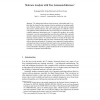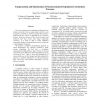84 search results - page 15 / 17 » Zero-Knowledge and Code Obfuscation |
101
click to vote
TSE
2008
15 years 2 months ago
2008
Buggy software is a reality and automated techniques for discovering bugs are highly desirable. A specification describes the correct behavior of a program. For example, a file mus...
114
Voted
VIROLOGY
2008
15 years 2 months ago
2008
Several malware analysis techniques suppose that the disassembled code of a piece of malware is available, which is however not always possible. This paper proposes a flexible and ...
167
Voted
CAV
2011
Springer
14 years 6 months ago
2011
Springer
Abstract. The underground malware-based economy is flourishing and it is evident that the classical ad-hoc signature detection methods are becoming insufficient. Malware authors ...
150
click to vote
SP
2010
IEEE
15 years 6 months ago
2010
IEEE
—To handle the growing flood of malware, security vendors and analysts rely on tools that automatically identify and analyze malicious code. Current systems for automated malwar...
225
Voted
ICDE
2007
IEEE
16 years 3 months ago
2007
IEEE
requirement. Furthermore, programming using sequence constructs normally produce nested structures and The current approachfor modeling synchronization in scattered code, especiall...


